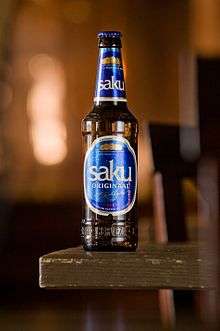Saku Brewery
 | |
| Public (Aktsiaselts) | |
| Industry | Beverage |
| Founded | 1820 |
| Headquarters | Saku, Estonia |
Key people |
Veli Pekka Tennilä (Chairman) Margus Kastein (Sales director) Enn Kärblane (Brewmaster) |
| Products | Beers, ciders, bottled water, long drinks, soft drinks, energy drinks |
| Website |
www |
Saku Brewery is an Estonian brewery and soft drinks company based in Saku. It was founded in 1820 by the local Baltic German landlord Graf Karl Friedrich von Rehbinder.
Estonian brewing traditions and Saku Brewery
Beer was already known in present-day Estonia between 500–1000 CE, when it was mostly used as a sacrificial drink. By the middle of the 13th century the first brewweries were established in the more populous villages. Beer was brewed at home, in abbeys and castles — it was the main drink together with small beer and milk. Soon the beer became so frequently consumed that fees and penalties were added to its cost.
Beer has become the main drink for Estonian farmers since the beginning of the 16th century. Beer was always brewed for bigger holidays and family events like wedding, baptisms and funerals. All kinds of beer songs and jokes relating to it were very popular among the common people.
The history of Saku Brewery begins in early 19th century, when the owner of Saku estate at that time, Karl Friedrich von Rehbinder—a nobleman of Baltic German descent—decided to build a distillery and a brewery on his land. The brewery was first documented in October 1820. It is believed that the production of beer, for the purpose of sale to pubs and taverns, began in the autumn of that year. From the end of 19th century onward Saku has remained among the leading breweries in Estonia.
Currently

In 1991 joint venture Saku Õlletehas was established. Since January 27, 1998 the shares of Saku Brewery were traded in the list on the Tallinn Stock Exchange. On 20 September 2008, the shares of Saku Õlletehase AS were delisted from Tallinn Stock Exchange. Today 100% of the shares are owned by Carlsberg Breweries.
Through large investments, Saku Brewery has become the market leader on the Estonian beer market. According to market research by Nielsen Corporation in March 2009, Saku Brewery held 38.7% of the local market share.[1] The total sales of beer by Saku amounted to 59 million litres in 2007.[2]
Beverages of Saku Brewery are exported amongst other countries to Sweden (the only Estonian beer in the Systembolaget is Saku Kuld), Finland, Netherlands, England, Germany, Ireland and Canada. Saku's exports during the first five months of 2009 amounted to 3.12 million litres.[3]
Currently, there are five breweries in Estonia, three of which belong into the Estonian Beer Brewers Association: Saku Brewery, A. Le Coq Brewery and Viru Brewery.[4]
Products

Saku Originaal is the flagship product of Saku Brewery and is made of yeast, water and selected malt and hops. Brewing of Saku Originaal started in 1993, making it the first Estonian beer to be sold after Estonia regained its independence. According to market research conducted by Emor in 2002, Saku Originaal is the most recognised and popular Estonian beer.[5]
In April 2009, Saku Brewery invested over 70 million kroons into a new crystal-filtering technology, the first brewery to employ this technology in Estonia. Saku Originaal was the first beer to be brewed using this technology. Crystal-filtering helps remove bacteria from the beer during brewing, giving the beer a longer lifetime and stronger taste.[6]
Besides beers, Saku Brewery also produces mineral water (Vichy), cider (Kiss), long drinks (Saku GN), and energy drinks (Battery, Super Manki).
- Beers[7]
Saku Originaal, Saku Kuld, Rock, Karl Friedrich, Saku Hele, Saku Tume, Saku Pilsner, Saku Porter, Humal ja Oder, Saku On Ice, Saku Dublin, Saku Manchester, Saku Koduõlu, Taurus, Presidendi 8
- Ciders[8]
- Kiss (Apple, Pear, Cherry, Peach, Blueberry-Raspberry, Pomegranate & Lime)
- Kiss Fiesta
- Kiss Premium Dry
- Somersby (Apple, Pear, Blackberry, Citrus Fruit, Apple 0.0%)
- Pilvine õun, Mesine pirn
- Long drinks[9]
- GN Long Drink (Grapefruit, Cola and Cactus-Lime)
- Seth&Riley's Garage (Hard Lemonade, Hard Ginger)
- Star Cocktails (London G&Tonic, Berlin Colameister, Miami Strawberry Margarita)
- Water[10]
- Vichy Classique
- Vichy Fresh (Raspberry-Rhubarb, Aloe Vera-Apricot, Lemon-Lime, Orange-Mango, Apple, Green tea-Pomegranate)
- Vichy Sport
- Vichy Vitamin (Daily, Sport, Reload)
- Värska Originaal
- Soft drinks[11]
- Saku Kali
- Lotte Limonaad
- Energy drinks[12]
- Battery (Battery, Battery No Calories – Lime)
- Super-Manki
Marketing
Among other marketing activities, Saku Brewery sponsors the following events and organizations:[13]
- BC Tartu, an Estonian professional basketball team
- Estonian Ski Association
- Hard Rock Laager, an Estonian rock music festival
- International Summer Competition for Skiers
- Rabarock, former Estonian rock music festival
- Silverspoon gastronomy award
- Saku Suurhall
References
- ↑ "Saku tõusis märtsis taas õlleturu liidriks".
- ↑ "Eesti Õlletootjate Liit: Õlleturg".
- ↑ "Saku õlle eksport on Rootsis oodatust suurem".
- ↑ "Estonian Beer Brewers Association: Members".
- ↑ "Emor: Leidke märgile emotsionaalselt õige koht".
- ↑ "Saku juht: klaaspudeli õlut filtreerime ainult meie".
- ↑ "Beer - Saku Õlletehas". Retrieved 1 January 2016.
- ↑ "Cider - Saku Õlletehas". Retrieved 1 January 2016.
- ↑ "LongDrink - Saku Õlletehas". Retrieved 1 January 2016.
- ↑ "Water - Saku Õlletehas". Retrieved 1 January 2016.
- ↑ "Soft drinks - Saku Õlletehas". Retrieved 1 January 2016.
- ↑ "Energy drink - Saku Õlletehas". Retrieved 1 January 2016.
- ↑ "Saku Õlletehas: panus ühiskonda".